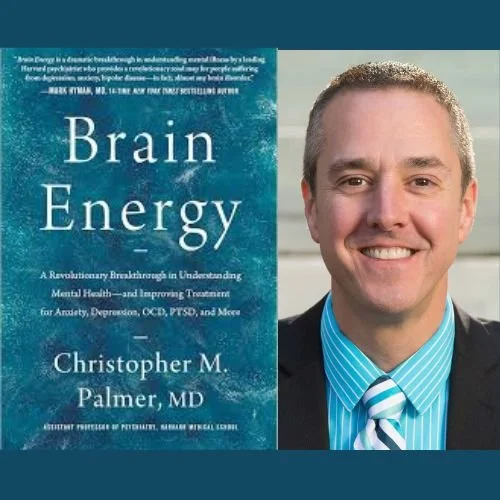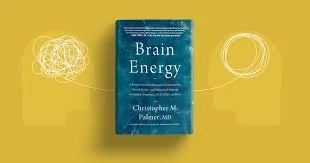Unlocking Mental Health Through Metabolism: Exploring Dr. Christopher Palmer’s Brain Energy Theory
Harvard psychiatrist Dr. Christopher Palmer is a pioneer in the emerging field of metabolic psychiatry. His groundbreaking book Brain Energy outlines a revolutionary framework for understanding mental illness through the lens of metabolism, which has gained worldwide recognition. In this post, we will explore his Brain Energy Theory, highlight some of the research and resources behind his work, and reflect on how his insights have influenced my own healing journey.
Dr. Christopher Palmer: A Pioneer in Metabolic Psychiatry
With nearly 30 years of experience in mental health research, education, and clinical roles at McLean Hospital and Harvard Medical School, Dr. Palmer’s professional accomplishments demonstrate decades of dedication to understanding and healing mental illness. In his video, "Why I Became a Psychiatrist," Dr. Palmer shares how his personal experiences with his mother’s mental illness motivated his mission to improve psychiatric treatment.
Witnessing the limitations of traditional psychiatric treatments firsthand, Dr. Palmer set out to find better solutions. His research journey, spanning over 20 years, has reshaped how we view mental health. In his 2017 article “Ketogenic Diet in the Treatment of Schizoaffective Disorder: Two Case Studies” published in Schizophrenia Research, Dr. Palmer recounts a pivotal moment that would change the course of his research. While helping a patient lose weight from medications that had caused metabolic damage, he recommended a ketogenic diet. The outcome was not only weight loss but also significant improvements in the patient’s psychiatric symptoms.
This unexpected result sparked a new trajectory for Dr. Palmer’s research. He has since published additional case studies, conducted clinical trials, and continues to explore the connection between metabolic health and mental illness. In November 2022, he released Brain Energy, where he presents his bold theory: mental disorders as metabolic disorders of the brain.
The Brain Energy Theory of Mental Illness
Dr. Palmer’s Brain Energy Theory posits that mental health disorders are fundamentally metabolic disorders of the brain. This dysfunction occurs at the cellular level, particularly in how brain cells produce and utilize energy. According to Dr. Palmer, disruptions in mitochondrial function, glucose metabolism, and oxidative stress impair neural networks, leading to symptoms of mental illness, including depression, bipolar disorder, schizophrenia, and anxiety disorders.
Dr. Palmer integrates decades of neuroscience, metabolism, and psychiatric research to challenge traditional views that separate mental illness from physical health. His theory positions metabolic health—affected by diet, lifestyle, stress, and medication—as a central factor in mental well-being.
In his book Brain Energy, Dr. Palmer explains this theory in-depth and explores how interventions like the ketogenic diet, exercise, and sleep optimization can restore metabolic function and improve psychiatric symptoms. The theory is supported by clinical case studies and research, including several of Dr. Palmer’s own publications in reputable medical journals.
My Journey with Dr. Palmer’s Work
The release of Dr. Palmer’s book coincided with my own discovery of the benefits of a ketogenic diet for managing my bipolar disorder. As I researched the transformative effects of dietary changes on my health, I found Dr. Palmer’s interviews and speeches, promoting his groundbreaking work in Brain Energy. Having already experienced the effects of therapeutic ketosis, I was open to Dr. Palmer’s theory and quickly immersed myself in his content.
Before discovering Dr. Palmer’s work, I understood the ketogenic diet’s broad health benefits, but I didn’t fully grasp the biological mechanisms behind how it was helping me. Dr. Palmer’s Brain Energy Theory explained the cellular biology and metabolic processes driving both mental illness and recovery. With this deeper understanding, I was able to refine my healing approach and address obstacles with greater clarity.
One of the most impactful interviews I watched was Dr. Palmer’s conversation with Tim Ferriss in November 2022. This in-depth interview offered a thorough and accessible explanation of complex metabolic and psychiatric concepts, making it a perfect entry point for those new to this field.
A Holistic Approach to Mental Wellness
As I continue on my healing journey, I frequently revisit Dr. Palmer’s work for guidance. His insights helped me realize that a holistic approach is essential for recovery. Diet alone isn’t always enough. In my case, following a manic episode in the fall of 2023, I learned the hard way that healthy sleep is just as crucial for mental health recovery—a key component Dr. Palmer emphasizes in his approach.
In addition to diet, managing stress, engaging in healthy movement, maintaining social connections, and collaborating with my healthcare team to identify appropriate supplements have become central elements of improving my mental wellness. These lifestyle factors are not just supplementary—they are foundational in supporting brain energy metabolism and promoting long-term recovery.
Dr. Palmer is also a key contributor to Metabolic Mind’s THINK+SMART Initiative, a framework designed to help individuals personalize their metabolic treatment plans. This initiative includes lifestyle pillars like therapeutic ketosis, healthy sleep, social interaction, nutrient optimization, and stress management—all in alignment with Dr. Palmer’s Brain Energy Theory.
Conclusion: Empowering Mental Health Recovery
Dr. Palmer’s Brain Energy Theory has been a game-changer for me, helping me understand the profound changes I’ve experienced and guiding me toward a more intentional and informed approach to healing. His research sheds light on the deep connection between nutrition, metabolism, and mental health, offering a hopeful, science-based framework for recovery.
Mental health recovery isn’t a straight path, but with the right knowledge, support, and personalized treatment, healing becomes not only possible but empowering. I am grateful to have found this path and to share it through Dr. Palmer’s groundbreaking insights.
If you're interested in exploring more, I recommend starting with Dr. Palmer’s book Brain Energy, visiting his website https://brainenergy.com, or watching interviews like his conversation with Tim Ferriss. These resources offer a deeper look into his theory and could provide new hope for those navigating mental health challenges.

